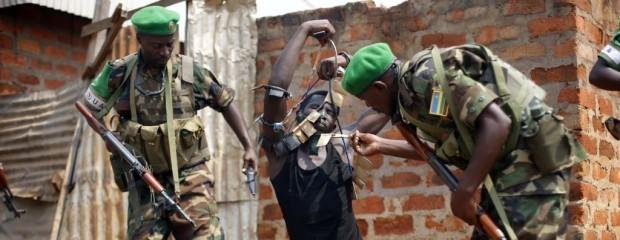Quo Vadis, ICC?
Pity the prosecutor. In the last few days, the very first case that Mr. Luis Moreno Ocampo has brought before the judges of the ICC is in the process of being thrown out because the prosecution failed to share evidence with the defense. We will learn in a few days whether the accused, the notorious Congolese warlord Thomas Lubanga is to be set free, celebrating in the technicalities of due process that he never accorded to others, not likely ever expecting such consideration to be extended to him. Despots and war criminals will not-so-secretly snigger at this humiliation for the ICC, but the real lesson of the Lubanga case is that the jurisprudential technicalities of mounting prosecutions at this level are so complicated and arcane that obtaining a conviction is frankly nothing less than a lottery. It’s mostly a matter of chance that Mr. Lubanga and not one of Congo’s dozens of other criminals against humanity found himself in a cell in The Hague facing charges against him plucked with apparent randomness from the episodes of nastiness in his long and bloodstained career. Few Congolese outside the legal cognoscenti understand why he and not others is in the dock and why he faced the particular indictments chosen by the Chief Prosecutor. And it is only law professors who will understand why the case against him can not now proceed to the verdict of guilty that seemed to all to be a foregone conclusion.
I feel compelled to add that if Mr. Lubanga were to be found guilty, as he surely deserves, most Congolese would be outraged to learn just how comfortable his incarceration will be. Without a shadow of doubt the convicted war criminal would live out his days in infinitely more comfort and contentment in his clean and well-appointed cell with first-rate medical care and conjugal visits from his wife than the poverty and struggle for their daily bread that his surviving victims and their families still have to endure.
The imminent collapse of the Lubanga trial, the failure to achieve either peace or justice in the Lords Resistance Army case, the non-progress on Darfur””pity the prosecutor. What tale shall serve him among his frustrated supporters and the defrauded victims?
Boutros Boutros Ghali used to say that the in-tray of the UN Secretary General was piled high with the files that the US Secretary of State didn’t want to deal with and passed on to him as problems with no known solution. In the same way, at least some of the cases in front of the Chief Prosecutor of the ICC are those that the UN doesn’t know how to deal with, and so when the Secretary General, or to be exact the Security Council, is flummoxed, it has the option of passing the buck to The Hague.
Just as every UN Secretary General pleads that the UN is no more than its member states, so he shouldn’t be blamed when it fails, the Chief Prosecutor might be tempted to search for alibis for failure. Indeed he won’t have any shortage of exculpations, as the UN is tying his hands by only giving evidence on a confidential basis, and he doesn’t have enough resources to conduct investigations and trials on the vast scale to deliver on the promise of justice for the people of Congo and Central African Republic and other places. Should these fail, he always has the number one excuse to fall back upon: the USA, for reasons best known to itself, is an implacable opponent of the ICC. I for one have never understood why the United States is so afraid of a court that operates under due process of law with the utmost transparency and scrutiny, and which can never bring a charge against someone from a country with a credible legal system. If the US government has other and better reasons to oppose the ICC it had better have a better argument than the unfounded fear that American servicemen might be the target of malicious prosecution, because it looks as though its bluff is about to be called.
By all accounts of his character and temperament, Mr. Ocampo has not the slightest intention of reducing his role to the purveyor of good excuses. The contest for the future of the ICC is being fought out on an altogether different and higher plane, a plane of arcane legalism and international political intrigue. The layman who thinks this is all about justice could not be more wrong, because it is about law, and when the world’s finest legal minds contend over what is for them the highest prize on the planet, only those practiced in the fine arts of legalistic sophistry will be able to follow their moves. On this I beg to disagree with Julie Flint, because Mr. Ocampo’s concern is surely not the portrayal of Darfur in terms that would be considered fair and objective by a professional journalist, but maneuvering the US administration into a political and legal corner from which it cannot escape. How the Prosecutor describes Darfur is relevant to his task only insofar as he is putting himself on precisely the same wavelength as the New York Times editorial page and the two Presidential candidates. They have officially described Darfur as genocide but when it comes to using the international regime for prosecution and punishment they don’t want to do anything to turn their words into actions. Mr. Ocampo is about to call the Americans’ bluff, and they surely know it. Either we shall finally discover what is the US’s true reason for opposing the ICC, or the world superpower will be compelled finally to extend its support to the Court and its Prosecutor, and thereby turn it into a truly unstoppable force for global justice or at least the judicial face of global policing. If the world’s war criminals are worried by the prospect of sealed arrest warrants being executed by United Nations peacekeepers, just imagine how alarmed they should be when the executing authority is none other than the United States Department of Defense.
Any future backing by the US government will not alter the fact that the operations of the ICC, from investigation through indictment and prosecution to conviction, are anything other than a lottery, but it will stack the odds mightily in favor of the Prosecutor. Whether or not Mr. Ocampo portrays Darfur in a way that the scholars and journalists consider objective is entirely beside the point, because the legal armory at the Prosecutor’s disposal allows him sufficient leeway to prove almost any case he chooses. The charge of joint criminal enterprise, as used by US attorneys to round up racketeers and fraudsters whom everyone knows are involved in shady dealings but whose culpability for specific crimes can not be demonstrated, is just one of the not-so-secret legal weapons he may choose to utilize. By using US legal precedents he could lay charges against just about any Sudanese leader, not to mention their foreign supporters as well, and find them guilty. If he has America and this particular American law on his side, the verdict is as good as in the bag and he can forget about the niceties of journalistic objectivity, because we all know that President Omer El-Bashir is guilty, of something horrible anyway, don’t we? Don’t pity the prosecutor, things are going his way.
Beshir Gedda is an Ethiopian writer.






It is shocking that legal complexity-or is it technicality- allows Lubanga to go free while his victims, whose lives are irreparably ravaged, are left without any chance of retribution. I hope he should not plug any loopholes when taking the perpetrators of Darfur genocide especially President Bashir who is calling the ICC terrorist organization, to The Hague.
Alesio
I do not agree that it is a “lottery” and that Lubanga’s release would be a result of “arcane … jurisprudential technicalities”. The Prosecutor has signed an agreement with the UN which prevents the defence from getting hold of potentially exculpatory evidence. There are some indications that the Prosecutor and the UN are changing their position.
The principle of a fair trial has to be upheld and if the Prosecutor’s decision brings down the Lubanga trial, we should blame the Prosecutor and not the ICC.